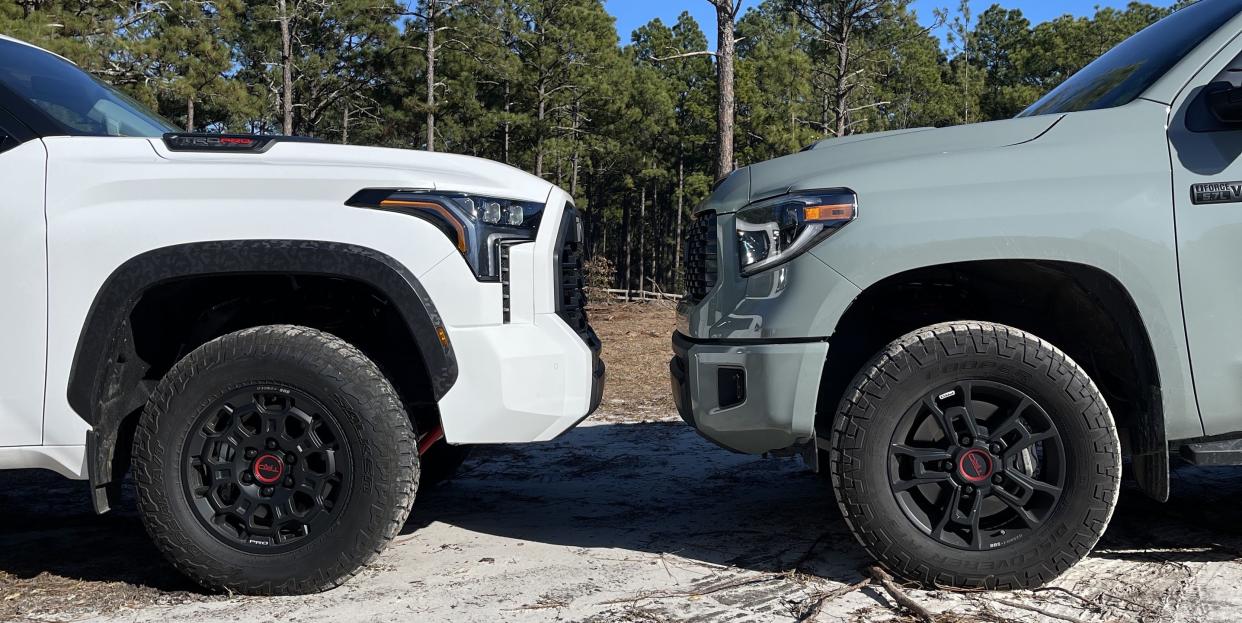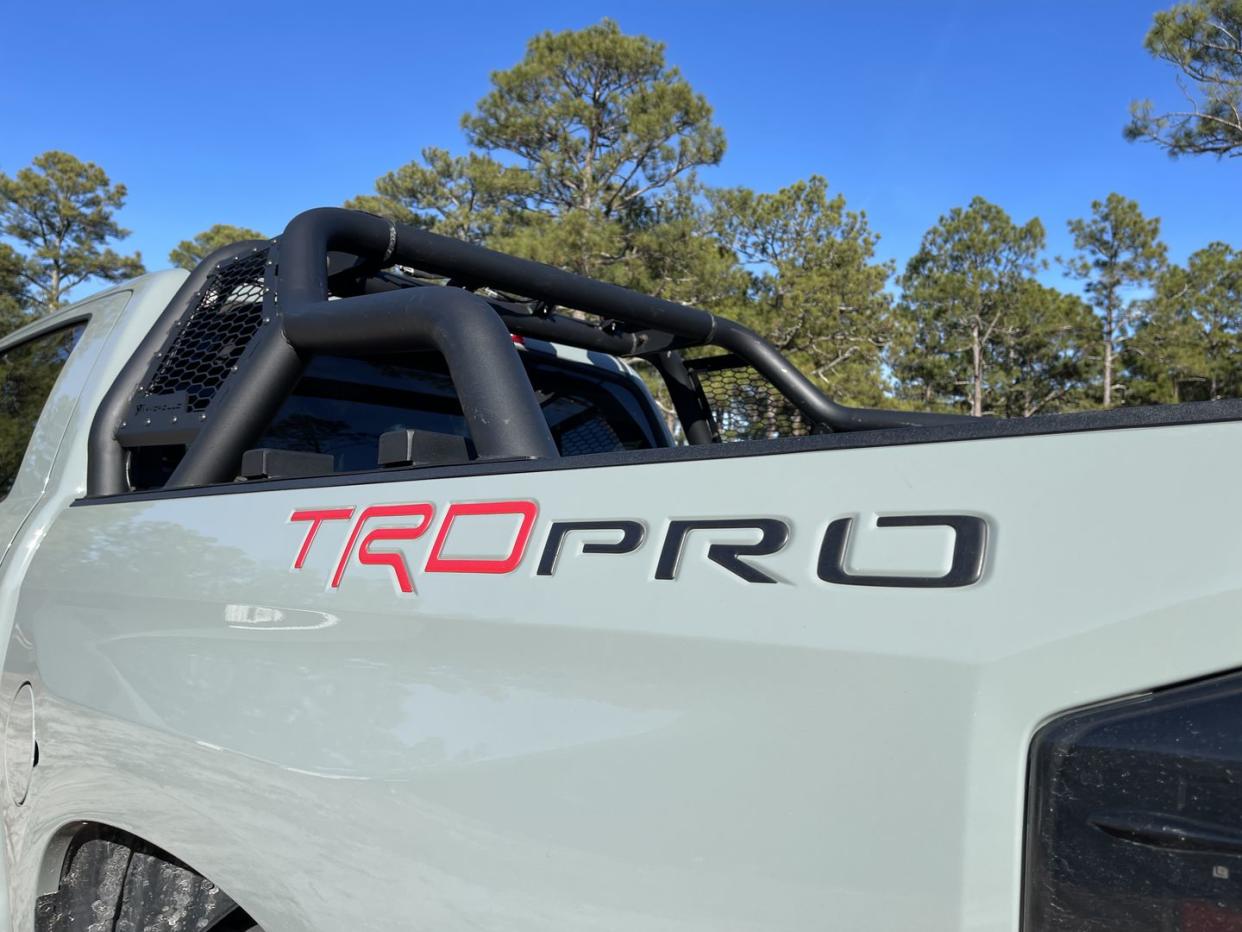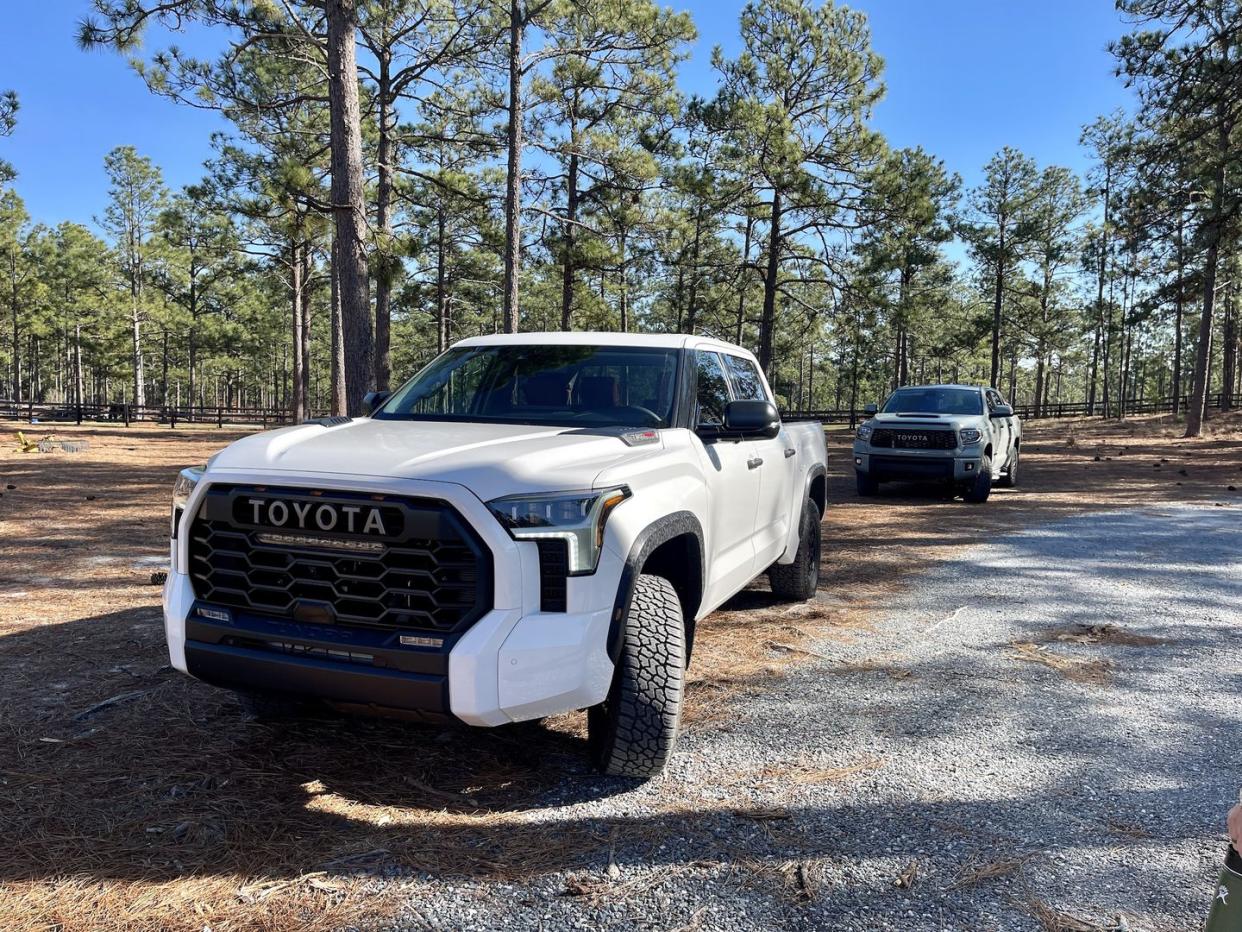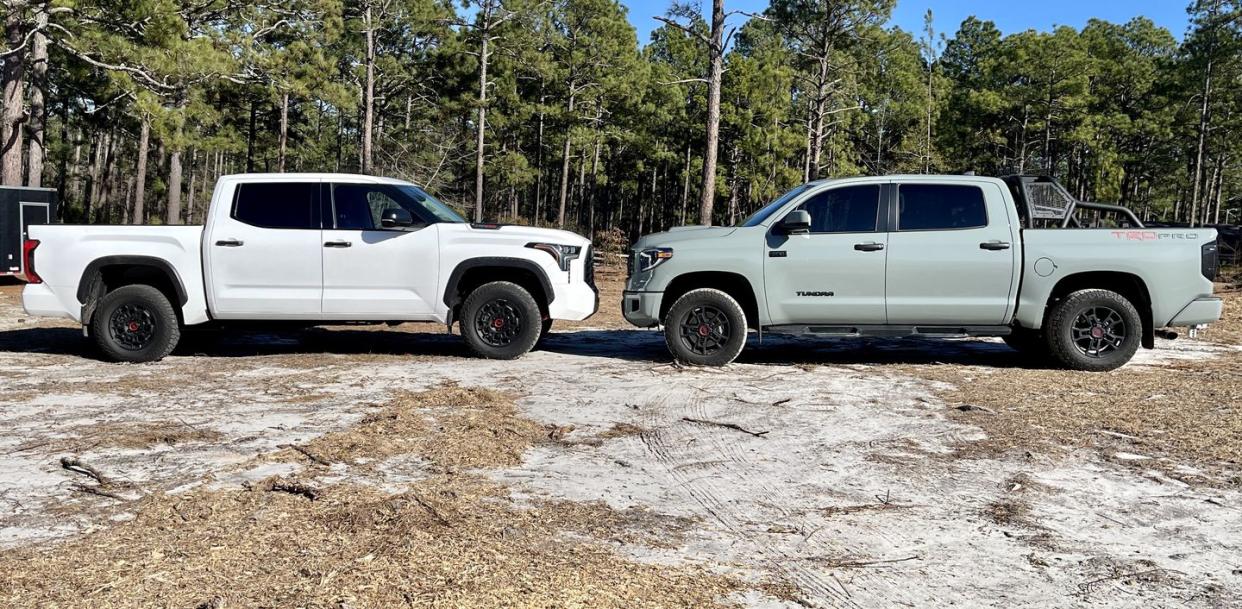Would You Rather: 2022 Toyota Tundra TRD Pro vs. 2021 Tundra TRD Pro?

Typically, pickup-truck redesigns are methodical evolutions of whatever came before—a little more power, a little different styling, maybe some clever new features. But the Toyota Tundra's 2022 redesign was more extreme than most, given that the previous generation remained mostly unchanged throughout its 14-year run. In the case of the TRD Pro, a naturally aspirated 5.7-liter V-8 was replaced by a twin-turbo V-6 and a hybrid system. The transmission went from a six-speed to a 10-speed, and the leaf-sprung rear end gave way to coil springs. And that's not to mention the new interior and exterior styling, which in the TRD Pro includes camo-patterned red synthetic leather upholstery and black camo fender flares. Would all of this be welcomed by Tundra customers, or would some of it be off-putting? To find out, I drove over to my friend Tom's house and pulled up next to his truck: a Lunar Rock 2021 Tundra TRD Pro.
Tom walks up and unlocks his truck with his phone, which admittedly surprises me—I didn't know the old Tundra could do that, but it's compatible with Toyota's Connected Services app. Tom's truck appears in the app as "Banner," as in Bruce Banner, as in a large green guy more commonly known as the Hulk. And the first thing we ascertain is that Banner has better water bottle holders in the front doors compared to its newer counterpart. When Tom puts his water bottle in the 2022 Tundra, the shape of the door panel forces it to angle out. It fits fine in his 2021 model. I thus award two points to Old Tundra, which is off to an early lead in the arbitrary scorekeeping that I will not actually keep track of. Now let's take a look at some other important categories and see whether Toyota moved the ball forward or made like the New England Patriots at the end of that December Colts game.
Interior
The new Tundra is certainly more extroverted and modern, for better or worse. The better: Everybody loves a top dead-center stripe on the steering wheel, the red dash is confidently outrageous and the giant retro TOYOTA badge on the passenger side is a fun shoutout to the company's 4x4 heritage. The new truck's seats are ventilated and well as heated, and the rear glass still rolls down. It's a more modern environment. "These seats are more comfortable than the ones in my truck," Tom says, which surprises me given that the older Tundra's seats look like overstuffed club chairs compared to the 2022 model's slimmer, sportier-looking thrones.
The worse side of that equation applies to a couple of areas. For one thing, the 14.0-inch touchscreen that controls the sound system lacks a volume knob or hard buttons, so scrolling through Sirius stations requires repeatedly jabbing the screen. "How are you supposed to look at that while you're driving?" Tom asks. Good question! The other drawback concerns the rear seat, where the 2021 model has underseat storage but the 2022 has its hybrid battery.
Stepping back from the trucks, I observe that the rear doors of the 2021 Tundra look longer, suggesting more rear-seat legroom. And when I look it up, that proves true, albeit not by much: 42.3 inches of rear legroom for the 2021 truck and 41.6 inches for the 2022. Still, there's a little more room in back to stretch out (and stash your stuff) in the old Tundra.
Behind The Wheel
There's no debating that the new Tundra's powertrain represents an improvement over the outgoing truck. In a recent comparison test, the 2022 TRD Pro hit 60 mph in 5.9 seconds versus the 2021 truck's 6.4 seconds, and by 100 mph it has a 2.1-second lead. The 2022 TRD Pro is also far more efficient, notching 16 mpg overall compared to the 2021's 12 mpg. So: quicker and thriftier, what's the drawback? Mainly just that it doesn't have a V-8 but pretends that it does.
"This doesn't have a V-8?" Tom asks as he floors the accelerator and the cabin fills with the sounds of V-8 muscle. Nope, I explain—it's a 3.4-liter twin-turbo V-6 paired with a 48-hp electric motor, playing a fake V-8 soundtrack through the stereo system. I tell him to roll down the windows. "Yeah, you don't hear it outside," he says. "Can you turn that off?" Nope.
The new truck and its predecessor don't have wildly different straight-line performance, but in terms of handling, the redesigned TRD Pro feels much tauter and controlled—the miracle of a coil-spring rear end. The skidpad numbers don't tell the tale of how much the handling improved (0.69 g for old truck, 0.70 g for the new one). Although, when I crawl under the front end, I see that the 2021 has remote reservoirs on its front dampers, while the 2022 only gets those at the rear. On the other hand, the 2022 gets an electronically locking rear differential, while the 2021 makes do with brake-based faux-limited-slip.
So the new TRD Pro wins on performance, except for one obscure but important area: the turning circle. The 2021 truck has a 44-foot turning circle, while the new truck requires 49.8 feet. You notice the difference when trying to pull into perpendicular parking spots, which usually require at least one reverse move to aim the bow into the spot. For comparison, the gargantuan GMC Hummer EV pickup has a 44.3-foot turning circle in two-wheel-steer mode and 37.1 feet when it uses its rear-axle steering.
Looks, and a Verdict

I feel like Toyota kept the old Tundra around for so long that its looks imprinted on owners as the definition of what a Tundra should look like, and the new one hasn't yet reset their expectations. But whatever you think of the basic shape—I think it looks generically handsome, while Tom thinks it's cribbing style from the Ford F-150—it's definitely lower-key about its TRD Pro-ness. The old truck's bedsides are emblazoned with huge TRD Pro graphics. It has a hood scoop—sorry, two hood scoops. The off-road driving lights are by Rigid rather than the in-house Toyota equipment on the new truck. Tom likes that. "If you're going to pay for a TRD Pro, it should be obvious that it's a TRD Pro," he says.

Even in the matter of non-TRD parts, the 2021 model is more braggadocious about its gear. The 2021 truck's door speaker grilles wear JBL badges and the new one's don't, even though it too has a JBL sound system. The old truck boasts of its engine, via "iForce 5.7L V8" badges on the doors, while the new one has no badging whatsoever on its flanks—just relatively small TRD Pro badges on the hood. Tom gestures to the V-8 badge and says, "The new one doesn't have that, because it can't."

It can be discouraging to buy the new vehicle and have it replaced with something fresh the very next year, but Tom isn't feeling too much FOMO after checking out the new TRD Pro. "I don't think I'd be interested in the new body style," he says. "It doesn't look like a Tundra, in my opinion. I do like the big screen and the seats are way more comfortable, but the fake noise thing is silly." And then there's the minimalist TRD aesthetic treatment. "It's hard to tell with this truck that it's a TRD Pro," he says. Maybe Toyota is counting on camo-pattern fender flares becoming a signature look that transcends badging, or maybe they'll get wilder with the Tundra's styling over the next few years.
But in the meantime, Tom's happy to stick with Banner.
You Might Also Like
